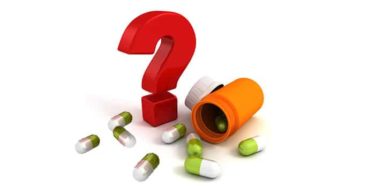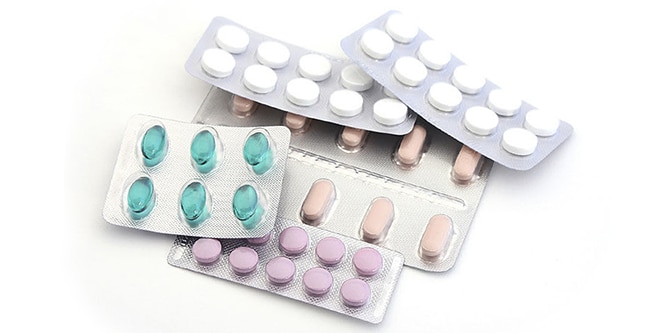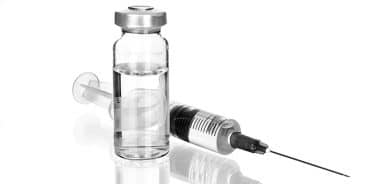Lexapro (escitalopram) is an antidepressant of the selective serotonin reuptake inhibitor group, which helps maintain mental balance by increasing the amount of serotonin in the brain. Although it primarily treats depression and anxiety, it can also work for panic attacks. Lexapro is a prescribed medication that must be used under the supervision of a doctor. Only the doctor can decide the dose changes and when to quit. Compared to other antidepressants, it has less side effects and is easily tolerated. Nevertheless, nausea, anxiety, weight gain, dizziness, weakness and dry mouth are among the main side effects.
Table of Contents
What is Lexapro (escitalopram)?
Lexapro (Escitalopram) is an antidepressant medication, which can be obtained with a prescription. It belongs to group of the selective serotonin reuptake inhibitors (SSRI). It increases the amount of serotonin (happiness hormone) that helps maintain mental balance. Although it is usually prescribed in the treatment of major depression and anxiety, it can also be used for chronic pain, panic attacks or obsessive compulsive disorder. It has less side effects comparing to previous antidepressants. (1)
What is Lexapro used for?
Indications for Lexapro
- Clinical depression treatment
- Anxiety treatment: Anxiety with agoraphobia (fear of open space), anxiety without agoraphobia, social anxiety and generalized anxiety disorder
- Treatment of obsessive-compulsive disorder

How does Lexapro work?
This medication belongs to a group called selective serotonin reuptake inhibitors (SSRI). The way how medications in this group work are similar and they treat similar conditions. Escitalopram increases the amount of serotonin (happiness hormone) in the brain and helps maintain mental balance. (2)
Serotonin is a hormone naturally produced in the brain that has positive effects on emotions and behaviors when it is secreted in sufficient quantity. Lack of serotonin can cause mental problems such as depression or anxiety. (3)
What conditions is Lexapro used to treat?
Lexapro for depression
Lexapro is mostly prescribed to treat major depressive disorder. This drug increases the activity of serotonin in the central nervous system with a quite strong effect. The probability of interacting with other drugs and its side effects are considered low.
In a randomized study to assess the power of escitalopram in the treatment of depression, the medication was observed to be more effective than and equal to other SSRIs and serotonin-noradrenaline reuptake inhibitors. In addition, escitalopram can prevent recurrence of depression in a long-term use. (4)
Lexapro for anxiety
In another study, the efficacy and tolerability of escitalopram in the treatment of generalized anxiety disorder were assessed. According to this study, development and improvement were observed in the group using escitalopram compared to the group using placebo (ineffective drug). In addition, it was well tolerated by the patients and the side effects were scaled as low. (5)
Lexapro for chronic pain
In recent years, SSRI group medications have been used in the treatment of chronic pain in addition to depression treatment due to their low side effects. In a study with drug addicts, escitalopram has been observed to decrease pain intensity.
Additionally, in a review evaluating the results of 36 studies, escitalopram was found to be significantly effective in the treatment of chronic pain compared to other drugs. However, more studies should be done on this subject. (6, 7)
How to use Lexapro?
- You can have Lexapro on an empty stomach or on a full stomach
- Have your tablets with plenty of water. Do not chew them, they may taste bitter. If you have trouble in swallowing, you can also have them by dividing them into two.
- Take your medicine at the same time every day, in the morning or at night before going to bed. Lexapro may cause weakness in some people and vice versa in others. You decide your time of taking it depending on the effect it makes on you.
- Always use medicine as instructed by your doctor. Do not stop taking drug or change its dosage without consulting your doctor. You may experience severe side effects.
- When you skip a dose, do not take a double dose to compensate it. If you remember your missed dose before bedtime, take it immediately and continue next day as usual. If you remember it during day, skip that dose, then continue taking it at its scheduled time.
- Although it has no known interaction with alcohol, never take it with alcohol.
- Continue treatment even if you feel better. (8)
Dosage of Lexapro
Lexapro is not suggested for patients under the age of 18 due to possible side effects such as suicide attempts or tendency, aggression, anger. However, when the doctor finds it necessary, it can be prescribed provided that the patient is closely monitored.
Escitalopram’s use and dose calculation in adult patients over 18 years of age:
In the treatment of depression:
- The recommended dose is 10 mg, once a day. If needed, it can be increased to a maximum of 20 mg per day.
In the treatment of panic disorder
- The starting dose is 5 mg once a day for one week. Then, the dose is increased to 10 mg per day. If needed, it can be increased to a maximum of 20 mg per day.
In the treatment of social anxiety disorder
- The recommended dose is 10 mg, once a day. The course of treatment is monitored and the doctor can reduce the daily dose to 5 mg per day or increase it to 20 mg if deemed necessary.
In the treatment of common anxiety disorder
- The recommended dose is 10 mg, once a day. If needed, it can be increased to a maximum of 20 mg per day.
In the treatment of obsessive-compulsive disorder
- The recommended dose is 10 mg, once a day. If needed, it can be increased to a maximum of 20 mg per day.
Lexapro Overdose
If you take more than the dose you should take, consult a doctor or pharmacist immediately and contact the nearest hospital’s emergency service, even if you do not feel any discomfort. If you need to go by car, do not drive, take a taxi or ask a someone for help.
Symptoms of Lexapro overdose:
- Irritability
- Nausea and vomiting
- Dizziness
- Faster or slower heart beats
- Seizure
- Tremors
- Reduced blood pressure
Take your medicine package with you when you go to the hospital or doctor.
Dosage forms of Lexapro
- Lexapro Tablet: 5 mg, 10 mg, 20 mg / Oral Solution 5 mg/5mL
- Lexapro Oral Solution: 5 mg/5mL
What can I take instead of Lexapro? (Equivalent drugs)
Other medicines containing escitalopram, such as Lexapro:
- Act Escitalopram: Tablet10 mg, 20 mg
- Escitalopram: Tablet 5 mg, 10 mg, 15 mg, 20 mg
- Escitalopram Oxalate: Tablet 5 mg, 10 mg, 20 mg, / Oral Solution 5 mg/5mL
- b 5 mg, 10 mg, 15 mg and 20 mg / Cipralex MELTZ: 10 mg, 20 mg
Contraindications for Lexapro
Who should not take Lexapro?
- Epilepsy: It can cause more attacks.
- Impaired liver or kidney function: Dose adjustment may be required.
- Diabetes: It can disrupt blood sugar control. The dose of diabetes medications should be adjusted.
- Low levels of sodium in the blood
- Tendency to bleed or bruise
- Receiving electroshock therapy
- Coronary heart disease
- Heart problems: Lower heart rate while resting, fast or irregular heartbeat while standing, fainting or dizziness due to heart rate irregularities
In these conditions, the use of Lexapro should be very careful and dose adjustment should be made under regular doctor supervision.
What drugs interact with Lexapro?
Concomitant use of Lexapro with some medicines may decrease the effect of the drug or cause severe side effects. Therefore, if you use any of the following medicines, be sure to inform your doctor:
Blood thinners
Escitalopram is a blood thinner, if you take it with other blood thinning medications, your risk of bleeding may increase. Drugs to be careful are warfarin, nonsteroidal anti-inflammatory drugs (diclofenac, ibuprofen, naproxen, etc.), apixaban, dabigatran, edoxaban, rivaroxaban.
Migraine medications
Some migraine medications that contain triptan may work similar to escitalopram. Taking these drugs with escitalopram may increase side effects. These drugs are almotriptan, eletriptan, sumatriptan, frovatriptan, zolmitriptan, naratriptan, rizatriptan.
Psychiatric drugs
Some psychiatric medications can increase the risk of possible side effects. These medications are:
- Monoamine oxidase inhibitors (MAOIs): This group of medications should not be used with escitalopram or within two weeks after having stopped escitalopram. Its misuse increases the risk of serotonin syndrome. This group of medications are isocarboxazid, phenelzine, tranylcypromine.
- Pimozide, an antipsychotic medication.
- Antidepressant medications: Citalopram, fluoxetine, fluvoxamine, paroxetine, sertraline.
- Medications affecting the central nervous system: Sleeping pills such as benzodiazepines, gabapentine, estazolam, temazepam, triazolam and zolpidem.
Medicines that reduce stomach acid
Taking medications that reduce stomach acid, such as cimetidine, with escitalopram may increase the level of escitalopram in the body and therefore, the risk of side effects.
Diuretics
Some diuretics can reduce the sodium level in the body. Escitalopram has a similar effect, too. Therefore, using these two groups of drugs together may cause sodium deficiency. Diuretic medications: Furosemide, torsemide, hydrochlorothiazide, spironolactone
Serotonergic medications
Serotonin syndrome is an extremely dangerous disease that can be fatal. Concomitant use of serotonergic drugs with escitalopram may increase the risk of Serotonin syndrome. Its symptoms are agitation, sweating, muscle twitching, and confusion. Serotonergic medications are:
- Selective serotonin reuptake inhibitors (SSRIs): Fluoxetine and sertraline
- Serotonin-norepinephrine reuptake inhibitors (SSNRIs): Duloxetin and venlafaxine
- Tricyclic antidepressants (TCAs): Amitriptyline and clomipramine
- Opioids: Fentanyl and tramadol
- Anxiolytic buspiron
- Triptans
- Lithium
- Tryptophan
- St. John’s Wort
- Amphetamines
Taking Lexapro while pregnant
If you are pregnant or planning to become pregnant, you should discuss the risks and benefits of using Lexapro with your doctor.
Using Lexapro in the last 3 months of pregnancy can cause some side effects in the baby. If your baby has symptoms such as difficulty in breathing, bluish skin, seizures, changes in body temperature or vomiting, contact your doctor immediately.
Never stop taking the drug if you become pregnant while using Lexapro. Consult your doctor or pharmacist.
Lexapro while breastfeeding
A small amount of escitalopram passes into breast milk. However, there is not enough research on its effects on breastfeeding infants. Although it is not recommended to use it during breastfeeding, you can still use it if your doctor thinks it is necessary for your health.
Is Lexapro addictive?
How to stop Lexapro?
Lexapro should gradually be stopped, within a few weeks under the supervision of a doctor. Stopping the medication suddenly can cause some withdrawal symptoms. These symptoms will be even more severe, especially after a long-term use.
Some patients may quit medication easily, but sometimes symptoms such as dizziness, tingling or burning sensation, sleep disturbances, anxiety, headache may appear. If you experience these symptoms or different problems, be sure to consult your doctor. Sometimes you may need to start the medication again.
What are the side-effects of Lexapro?
Common:
- Nausea (very common)
- Nasal congestion or discharge
- Anxiety and restlessness
- Change in appetite
- Diarrhea or constipation
- Sleep disturbances (abnormal dreams, difficulty in going to sleep)
- Drowsiness and weakness
- Fever
- Yawning
- Tremors
- Tingling in the skin
- Dry mouth
- Excessive sweating
- Joint and muscle pain
- Weight gain
- Sexual disorders (erection problems, sexual aversion and orgasm problems in women)
Uncommon:
- Rash, hives (urticaria) or itching
- Teeth grinding and irritability
- Panic attacks, dizziness and confusion
- Sleeping disorder
- Growth in the pupils or vision impairment
- Taste problems
- Fainting
- Tinnitus
- Hair loss
- Weight loss
- Fast heartbeats
- Vaginal bleeding
- Swelling in the arms and legs
- Nose bleeding
Rare:
- Slower heart rates
- Aggression
- Hallucinations
WARNING: If you experience any of the following side effects, contact your doctor or emergency service immediately:
- Bleeding: Gastrointestinal bleeding etc.
- Allergic reaction: Swelling of the skin, tongue, lips or face; difficulty in breathing and swallowing
- Serotonin syndrome: High fever, agitation, lightheadedness, tremors, and sudden contractions in the muscles
- Liver dysfunction or hepatitis: yellowing of the skin and white part of the eyes
- Torsades de Pointes: Extremely dangerous condition. Manifested by irregular heartbeats and signs of fainting.
- Difficulty in urinating
- Seizures




